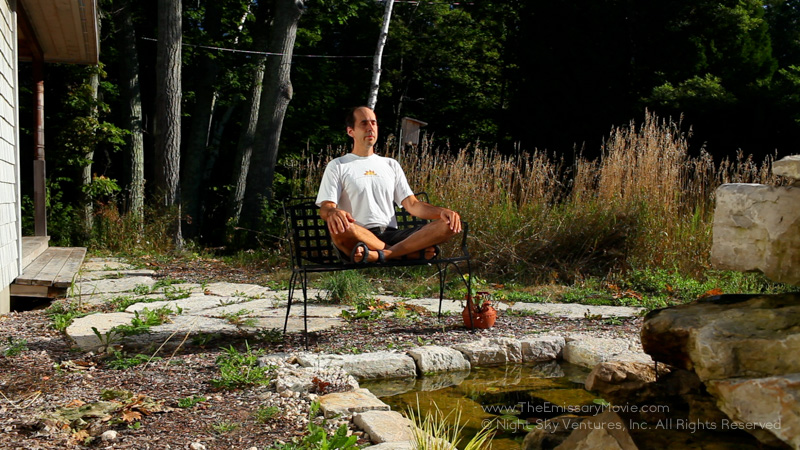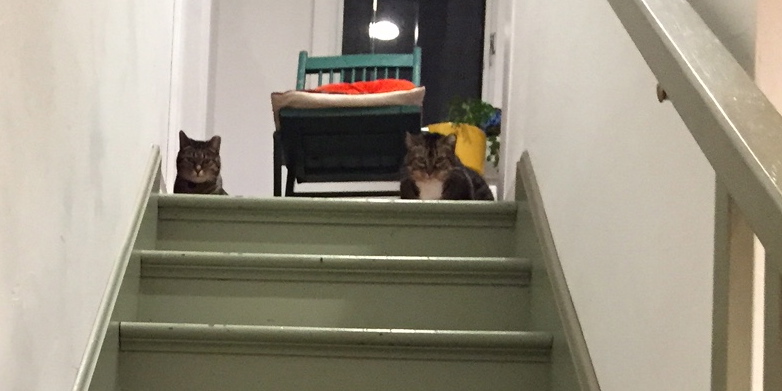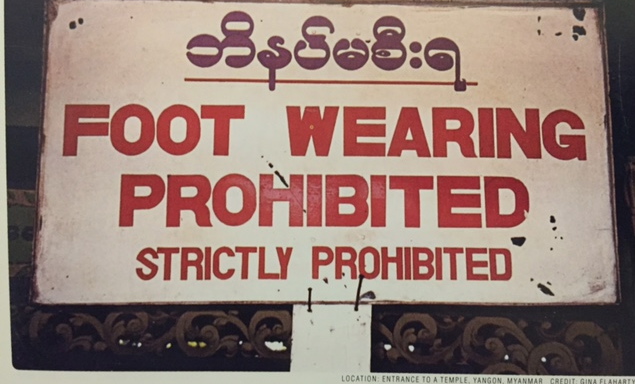Home Movie Facts Fans+Reviews Where to Watch News+Blog Store

I perform a short list of activities every day. Three things, sometimes four. It's taken me a number of years of grouchy fumbling around to figure out
how to get these habits to stick. They HAVE been sticking for over five years as of now. Something is working! I call this list my ME-things.
ME isn't a clever acronym, it just signifies activities that support me in a fundamental and ongoing way. It's that simple.

In the Emissary Movie, Jim learns to meditate and decides that everyone else needs to practice as well. Jim is unintentionally annoying but he means well.
Your List of You-things should be unique to you. It's not my intention to have other people adopt my specific ME-things. The purpose of this
article is to share tips on how to transform your YOU-things into daily joys, without the whole Eat Your Spinach overtone. That's the trick. Don't
do something only because someone else does it.
Everyone has different rituals that are meaningful only to them. I know one woman who must do a Qi Gong routine every evening. I can tell it is a priority for her because when we ask her to do something for an evening, she carefully deliberates how she can still do her routine, and sometimes she turns us down when our proposal precludes her ritual. I admire her strict adherence to doing what she knows she needs.
What qualifies as a ME-thing? It is something that feels like it is just for you, and healthy in some physical, spiritual, or mental way.
A Me-thing supports the rest of your day, when you are not doing the ME thing. Their effects should be reinforcing.
For example, every day I do:
1. at least 30-45 minutes of aerobic exercise of some sort
2. my yoga routine
3. writing down my dreams and journaling
Logic alone doesn't work. If logic alone worked on creating healthy habits, we would all be a lot healthier. We know smoking is bad for us and exercise is good for us and so on. The heartfelt emotion of positive reward creates reinforcing memories.

Just because it is logical doesn't mean that it is helpful. (Southwest Namibia; photo credit Nathan Broom)
Logic says: I know that research strongly supports that exercise is the best way to prevent the dementia that my mom has, which I fear getting. Exercise works as well as medication for anxiety and depression according to several studies too. I know this, but knowing this is true is not as reinforcing as emotional experience.
Emotion says: If I skip my exercise, I go out of my skin, wanting to blow of steam, like a hyped-up toddler that has to sit still in a long, uncomfortable
church service.I focus on the emotional reward during and after my exercise. I listen to audiobooks and my favorite podcasts during my leaping around,
and that is such a treat, too.
If I skip my yoga, my muscles cry all day, begging to be stretched. I focus on the massage-like sensation I get from my yoga routine.
I feel deprived if I can't get that.
When I don't write in my journal, my brain fogs up with mental sticky notes with no place to stick them.
Beating yourself up REALLY doesn't work.
This one seems so obvious that I almost neglected to mention it. If you are beating yourself up over not doing something, ask yourself if you would say the same mean things to someone you care about. In either case, it doesn't work.

Calling yourself names is no fun and it doesn't create long-term motivation. (Nicosia, Cyprus; photo credit Jessica Vapnek)
Humans prefer carrots to sticks. The sense of feeling a positive reward is an exercise. Exercises have moving parts. In this case you are moving little
molecules in your brain that go "whee!" every time you recognize the reward sensation. The more you move these molecules that make you go "whee!" the
more you will have that feeling. It is bicep curls for your brain. This feeling grows stronger the more you do it. ME things should feel like a treat,
and thus you should really take time to relish the positive sensation you will get from doing them. If they are healthy, you will
feel good in some way for doing them. Focus on the "whee."
Positive reward-emotion isn't quite enough, either.
You would think that the emotional discomfort of not doing my ME things would be enough to keep me doing them, but no. I have had to learn additional tricks.
It's taken me years to figure out ways to make these habits stick, with lots of course corrections along the way.
It's OK to have an off day.
It's a rare day that I miss a ME thing, but I let myself miss them and don't get freaked out about it. Travel days, especially hectic work days, and sick
days create a deficit of time and sometimes I can't get up early enough in the morning to make up for that. I just try to be logical about what I can
and can not do.
Expect your ME-things to evolve and change over time.
ME-things change over time, and you should expect your list to evolve, but you also want to keep it reasonable to do.
Practicing my harp an occasional ME thing, something that I would love to do every day, but usually falls by the wayside unless I have some upcoming performance
that I am freaking out about. "Accessory" ME things like music practice are activities I try to do every day, but they usually end up getting done
every other day. I keep my eye on them; maybe I can turn them into permanent ME things some day.
And now: the overused cliche!
There is always something to do around here that is urgent. We have four companies now. I used to go around doing things for other people telling myself
how urgent it was that I helped them, before doing my ME things. And then I never got the ME things done and I got irritated at the innocent people
I was doing things for. Silly me. Doing ME-things falls in the category of that pious trope of putting on your own oxygen mask before you assist
others, as sanctimonious and self-serving as that may sound. (I myself have had been forced to wear oxygen masks on so many airplane flights, haven't
you?) Pious tropes get under our skin precisely because we know they contain some irritating truth.There you go.
THE most helpful trick for me is crossing things off early in the day. And for an old night-owl like me, that is something.
Many years ago accomplishing my ME things before the day was done was a major flail. All too often something would come up and interfere, and then I would grouchily blame the interruption. I had not realized the problem was me.
The biggest breakthrough for me to learn was: do your habits as early as possible in the day. (There is a caveat for this in my TIPS section below.) Doing my three ME-things early was what did the trick for me. Now I am not a morning person, so the fact that this has really been working for me, for years now, is especially remarkable.
If you are not at your best in the morning, it might be your genes. Biochemists have pinpointed genes that help explain why some people are, as they classify them, "larks" and "owls".
I was born an owl. When I was little I would be up all night reading, sleeping late into the morning if I could. I still read until midnight or at
least 11:30. It is one of my favorite things to do in life. My husband happily reads beside me, covered in cats, but conks out early. I continue reading
with my red LED headlamp. (Red light interferes less with sleep-inducing melatonin and keeps the husband from whining.)
The roles are reversed in the morning. I am preverbal, warily watching my garrulous energetic husband gesturing widely, asking me what I think of the latest (black hole, weather, Wisconsin politics, cat antics, preset on the latest digital audio workstation, etc.) He is a lark. It hurts. I reply like Frankenstein's monster, moaning.
Only after I have consumed at least two cups of coffee, the first one often in the more desperate form of instant, can I begin to wake up the language center of my brain. I swear Broca's area goes offline while I have spent a night in dream mode.
So why did this old night owl adopt the habit of getting her ME-things out of the way early? After reading a few science-based books on habit*, I repeatedly came across a theory that has been accredited at least in part to psychologist and author Roy Baumeister, and for the most part supported by plentiful and various
research protocols; the concept of ego depletion.
In short, the theory suggests that your decision-making ability may be a conserved resource. Decision-making gets harder during the course of the day. So if you want decide to do something hard, it is best to do that thing early. Preferably after coffee in my case.
Clarify your intentions. What are your personal ME things? It could be a form of exercise, contemplation, prayer, taking your vitamins,
eating your spinach, writing, making music, some form of art or self-expression...you will know what it is that is meaningful to you as a daily practice.
Create substitutions. If I can't run, I use the treadmill, elliptical, or do Nordic Track, use a lateral slide board, or just jump around like a nut and hope no one sees me. Substitutions keep your activity fresh, and cross training prevents injury in the case of exercise. If one of your ME thing is artistic, find a different form. Instead of playing harp I might practice piano for example, and count that as done. Instead of a breathing meditation I might try a kindness meditation. Each ME thing ought to have a bunch of different ways to do it.
Set signals.
If you live with someone, signal when you are doing a ME thing. When I am writing in my office, I move a little wooden chair to the top of the stairs where Tim can see it from downstairs. It is Chair Sign. Chair Sign means Holly is Writing. Tim is awesome about respecting Chair Sign. I love him for this. We have contemplated wearing funny hats around the house for when we are in Thinking Mode and not to be disturbed. You can invent your own.

Behold the Sign of the Chair, complete with cat guardians. Chair sign means Holly is writing and Do not Disturb.
Don't forget the purpose of your ME things. It is to support the rest of your life, when you are not doing them. A good ME thing will support your work, your relationships, your health, but it should not take over your life either. For example, my journal writing always generates ideas that I stash away in a file to polish and publish later, like in this very column!
Don't make your list too long or too hard. There should be some "always do" and some "usually do". You should feel like some part of you really misses doing them if you don't do them, too. That's what will keep you going.

If you make it too hard, you probably won't do it. (Yangon, Myanmar; photo credit Gina Flaharty)
Be very, very specific. Don't say, "I should get some exercise." Say, "I am going to walk down to highway 42 and back again, at a fast pace, listening to my latest audiobook, and look for spring morels along the way." Instead of "I should practice music" say, "I am going get through only the first page of that Irish reel on the harp."

Research supports that it helps to be very specific if you want to accomplish a goal.
Sign from the Alexandria Aquarium, or some kind of place where fish is in tanks. (Photo credit Jeff Vize)
The Amazing Time Limit Trick! This is such a good one that I have to write a whole article on it, in more detail. It works to get yourself
doing both things you want to do, but think you don't have time for, plus things you dread. If you tell yourself, "I will just do five minutes", or
twenty, or whatever, and even set a timer, it doesn't seem so overwhelming. You don't have to do it all at once if it is a big task, for example.
For a while I was struggling to find time to meditate. I had gone from five minutes, to ten, to twenty! Wow! But finding twenty
minutes a day was really getting to be a struggle. I would miss many, many days in a row completely. Finally I had enough. It seemed better to do a
shorter meditation on a regular basis than none at all. Now what do you know, I am doing ten minutes a day every day. It's working.
Watch for The Domino Effect. This
is a good thing! People who develop just one small, good habit start developing good habit mental machinery which affect other unrelated areas of their
lives. For example, someone who learns to run every morning may find they are more likely to balance their checkbooks on a regular basis.
If morning really doesn't fit your schedule, find a time that does, and stick to it. Books on habit speak of the importance of tying a habit to a cue. Time of day and location make for strong cues. (Notice how many Wisconsinites start drinking at 4 PM for example. Not that you should start doing that.) If 6 PM after work is your cue to go to the gym, then you have found something that works.
Don't waste time with regret. All the books on habit say you should not beat yourself up if you miss doing your daily thing. Don't dwell on that. It's counterproductive. Just focus on doing it the next day.
Don't blame other people for your not being able to do your ME thing. This took me a while to figure out, too! I used to blame my poor husband, who was just thinking of all sorts of things for us to do during the day. Of course! I should expect that, and be grateful, even. It was a relief, actually to realize, it really is all completely up to me, which is empowering, after all. If someone else has a lot of activities for me to do the next day, I just have to set my clock earlier to get my ME things done. It is up for you to tell people that you are busy and after you do your ME thing. Just give them your full attention when you are done.
Plan for interruptions. What will you do when the phone rings, you get hungry, someone asks for something, etc? Have contingency plans for when these things happen. They WILL happen. I turn off my phone. I turn off my email. I get snacks prepared.
Change won't power to will power. Instead of giving things up, you are substituting new things that are even better. I find resisting
things or giving things up harder than adopting new things. You should not feel you are denying yourself. So if you are trying to NOT do something,
find a healthy substitute that you love. If you enjoy the relaxing feeling of having a glass of wine with dinner, but you find one glass turns into
three, why not switch to a hot cup of cocoa, or tea, and the resulting deep, delicious sleep that results? Instead of soda, have sparkling water and
add whatever herbs and spices you like. You should feel like you are switching up instead of giving up. Sometimes what I am getting as a substitute
is more abstract. Instead of having a glass of wine with dinner, I'll have herbal tea, and I gain amazing, deep, delicious sleep, which I have learned
to crave.
Log it. Some folks enjoy keeping a paper log book. Or download a reminder app. There are a load of free apps you can download onto your
computer or phone that will have you make a list of daily habits, and you can check whether you have done them or not. I am not religious about using
these, but they help. I use Medivate, a simple, online free account, to log my meditation sessions. I can write private notes to myself about how it felt, sometimes it is awful, sometimes
great, but then I see the log and get a sense of accomplishment. Plus if I like, it can nag me by email or congratulate me based on a goal that I get
to set and change over time.
Prepare the night before. Do you have an appointment early in the morning? I set up my exercise clothes, charged up MP3 player, headphone, breakfast, coffee timer (of course), all ready to go on mornings when I know it will be especially tight time-wise. It's an act of love to make it easy for yourself the next morning. When you wake up, you will say, Oh, how sweet! I made this easy for myself!
Let me know what works for you, I am certain I have only scratched the surface of this enormous topic.
*Books:
The Willpower Instinct: How Self-Control Works, Why It Matters, and What You Can Do to Get More of It
Kelly McGonigal
The Power of Habit: Why We Do What We Do in Life and Business
Charles Duhigg
Willpower: Rediscovering the Greatest Human Strength
Roy F. Baumeister, John Tierney
News+Blogs Categories
Archive

